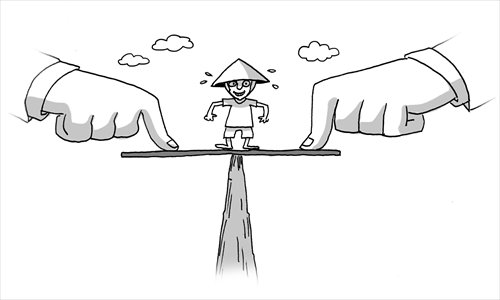HOME >> OP-ED
Vietnam, US get closer but distrust lingers
Source:Global Times Published: 2015-7-6 23:43:03

Illustration: Liu Rui/GT
Nguyen Phu Trong, general secretary of the Communist Party of Vietnam, is visiting Washington. It is the first such trip since Vietnam and the US ended their bitter war 40 years ago and were reconciled with each other 20 years later. Trong is expected to talk with US President Barack Obama about "trade, human rights and defense cooperation" during his trip, according to a White House statement. Trong also said that he expects Obama's return visit later this year.
Hanoi and Washington are moving closer despite their historical feud and long-term mutual distrust. An arch enemy of the US in the 1960s, Hanoi is now eager to seek common interests with Washington. For instance, it is active to become a founding member of the US-led Trans-Pacific Partnership.
Many international analysts argue that the "from-foe-to-frenemy" change between Vietnam and the US results from Hanoi's growing tensions with Beijing over maritime disputes. There has also been starry-eyed speculation that Vietnam is seeking an alliance with the US.
As a conservative inside the Communist Party of Vietnam, it is almost impossible that Trong will lead his country to embrace the US as the Philippines does. A new election in Vietnam is coming next year, and it is still hard to predict whether a new leadership will recalibrate Vietnam's foreign policy and national strategy, but considering the fact that Vietnam has been putting consistent efforts for half a century in preventing US ideology from affecting the country and guarding against conspiracies by the US, the ruling party won't end up like a lackey like Japan or the Philippines. Besides, their historical feud will continue to be an unsurmountable barrier to an alliance-like relationship.
Aside from its territorial disputes with China, Vietnam, a country that is increasingly involved in the international community in all respects, has right to develop a closer relationship with the US. It is a one-sided judgment that the improvement of Vietnamese-US ties is only due to China's rise.
Since the end of the oil rig row last August, which triggered a series of protests against China in Vietnam, both countries have undergone much fewer disputes this year. Vietnam has gradually realized that respecting China's core interests is a prerequisite to maintaining a reciprocal relationship with it.
Vietnam must understand that it cannot take advantage of one major power's strength to counter another. Its close relationship with one major power cannot be built on the cost of the national interest of another major power. This is the key to maintaining a relatively balanced and independent position.
Trong's visit will certainly enhance Vietnamese-US relations and help both countries find more common interests. But during his visit, it would be wise of Trong to dispel the misleading ideas that say Vietnam must depend on the US in moving against China. He had better think twice before he attempts to put China on the agenda.
The article was compiled by Global Times reporter Liu Zhun based on an interview with Luo Yongkun, an assistant research fellow of the China Institutes of Contemporary International Relations. liuzhun@globaltimes.com.cn
Posted in: Viewpoint